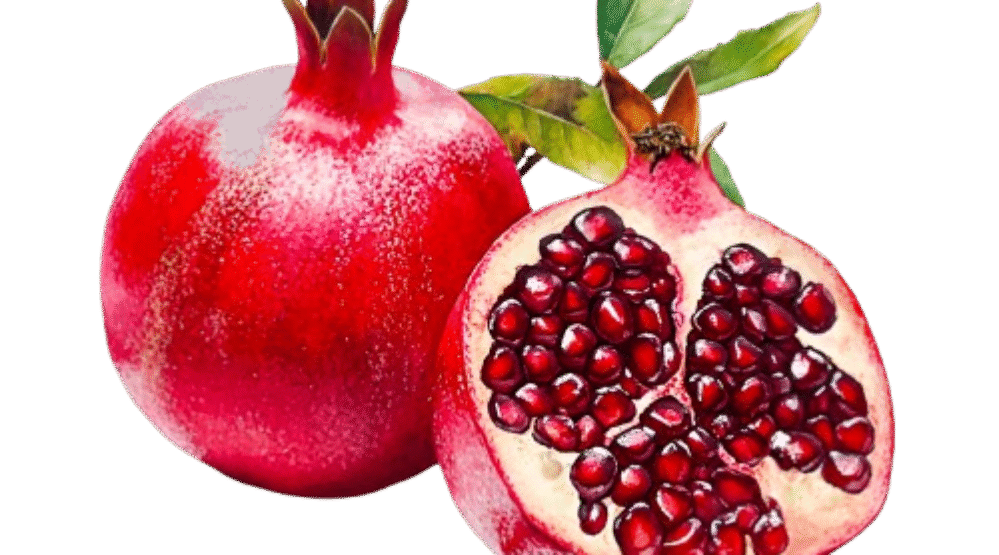Pomegranate (Punica granatum) is a nutrient-rich fruit known for its medicinal properties, cultural significance, and culinary versatility. Native to Iran and Northern India, this deciduous shrub has been cultivated for thousands of years across Asia, the Mediterranean, and the Middle East.
Pomegranate (Punica granatum): A Comprehensive Guide
Packed with antioxidants, vitamins, and polyphenols, pomegranate is widely recognized for its heart health benefits, anti-aging properties, and immune-boosting effects. This guide explores its history, nutritional profile, health benefits, medicinal uses, cultivation, and recipes.
Historical Significance & Cultural Importance
Pomegranate has been revered in ancient civilizations, including Egypt, Greece, Persia, and India. It symbolizes fertility, prosperity, and longevity in various traditions.
Pomegranate in Ancient Cultures
- Egyptian Mythology: Used in burial rituals and believed to grant eternal life.
- Greek Mythology: Associated with Persephone and the underworld.
- Indian Ayurveda: Used for digestion, heart health, and skin rejuvenation.
- Islamic Traditions: Mentioned in the Quran as a fruit of paradise.
Botanical Description
Pomegranate belongs to the Lythraceae family and is classified under the Punicoideae subfamily.
Plant Characteristics
- Growth: Shrub or small tree, reaching 5–10 meters in height.
- Leaves: Glossy, narrow, oblong, and bright green.
- Flowers: Orange-red, tubular, and five-lobed.
- Fruit: Round, leathery-skinned, with juicy red arils surrounding seeds.
Cultivation & Growing Conditions
Pomegranates thrive in warm, dry climates and require well-drained soil.
- Ideal Temperature: 25–35°C for optimal fruiting.
- Soil Type: Loamy, slightly acidic soil with good drainage.
- Propagation: Grown from seeds, cuttings, or grafting.
- Harvesting Season: September to February in the Northern Hemisphere.
Nutritional Profile of Pomegranate
Pomegranate is rich in essential nutrients, making it a superfood for overall health.
Nutrients in Pomegranate (Per 100g Serving)
| Nutrient | Amount | Health Benefits |
|---|---|---|
| Vitamin C | 10.2mg | Boosts immunity & skin health |
| Fiber | 4g | Supports digestion & gut health |
| Potassium | 236mg | Regulates blood pressure |
| Polyphenols | High | Powerful antioxidants for heart health |
| Iron | 0.3mg | Prevents anemia & improves oxygen transport |
| Magnesium | 12mg | Supports muscle & nerve function |
Health Benefits of Pomegranate
1. Heart Health & Cholesterol Control
- Reduces LDL (bad cholesterol) and boosts HDL (good cholesterol).
- Improves blood circulation, preventing heart disease.
- Lowers blood pressure, reducing hypertension risk.
2. Anti-Aging & Skin Health
- Rich in antioxidants, preventing wrinkles and fine lines.
- Boosts collagen production, improving skin elasticity.
- Protects against UV damage, reducing pigmentation.
3. Supports Digestion & Gut Health
- High fiber content aids digestion and prevents constipation.
- Balances gut bacteria, reducing bloating and acidity.
- Stimulates gastric juices, improving nutrient absorption.
4. Diabetes Management
- Regulates blood sugar levels, preventing spikes.
- Improves insulin sensitivity, reducing diabetes risk.
- Contains polyphenols, which protect pancreatic cells.
5. Brain Health & Cognitive Function
- Enhances memory and focus, reducing brain fog.
- Protects against neurodegenerative diseases like Alzheimer’s.
- Reduces stress and anxiety, promoting mental clarity.
Medicinal Uses of Pomegranate
1. Pomegranate Juice for Immunity & Detox
- Recipe: Blend 1 fresh pomegranate, strain, and add honey for taste. Drink daily for immune support.
2. Pomegranate Peel Powder for Digestion
- Usage: Dry and grind pomegranate peels, mix ½ tsp powder with warm water. Drink before meals for gut health.
3. Pomegranate Seed Oil for Skin & Hair
- Usage: Apply pomegranate seed oil to skin and scalp for hydration and nourishment.
4. Pomegranate Tea for Heart Health
- Recipe: Boil pomegranate peels with cinnamon and ginger for a heart-healthy herbal tea.
Scientific Research on Pomegranate
Several studies confirm pomegranate’s therapeutic properties:
- Pomegranate reduces cholesterol and improves heart health (Journal of Nutrition, 2023).
- Pomegranate extract enhances memory and cognitive function (Neuroscience Research, 2022).
- Pomegranate’s antioxidants protect against cancer (Cancer Prevention Research, 2021).
How to Include Pomegranate in Your Diet
- Raw Pomegranate – Eat fresh for maximum benefits.
- Pomegranate Juice – Drink daily for detoxification.
- Pomegranate Seeds – Sprinkle on salads or yogurt.
- Pomegranate Molasses – Used in Middle Eastern cooking.
- Pomegranate Tea – Brew dried peels for a healthy drink.
Side Effects & Precautions
While pomegranate is generally safe, excessive consumption may cause:
- Acidity due to high polyphenol content.
- Allergic reactions in sensitive individuals.
- Blood pressure fluctuations in hypertensive patients.
Conclusion
Pomegranate is truly a superfruit, offering unmatched health benefits for heart health, digestion, skin, hair, brain function, and immunity. Whether consumed raw, as juice, powder, or oil, it remains a powerful natural remedy for overall wellness.
Start incorporating pomegranate into your daily routine and experience its incredible benefits.




